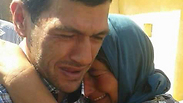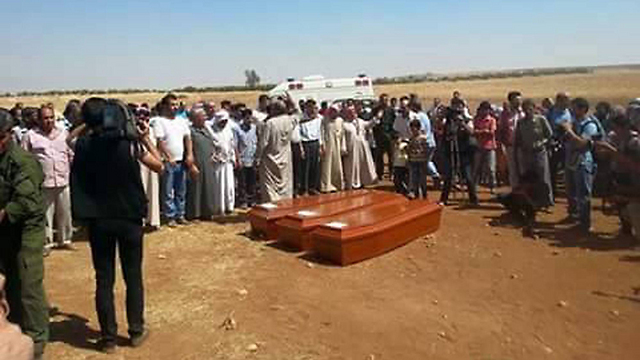
Can a shocking picture change the plight of Syrian refugees?
Op-ed: As he buried his wife and two little boys in Kobani, Abdullah al-Kurdi appealed to Arab leaders to draw conclusions from his tragedy and help other refugees. But will anything happen after the shocked world forgets the 'picture of the year'?
Abdullah al-Kurdi, whose world was shattered after he failed to save his wife and two little boys, insisted on burying them in the town of Kobani, from where they fled for their lives. "I don’t blame anyone," the bereaved father said at the funeral. "I tried, and no one in the big world wanted us. I am returning home. I will sit by their graves till the day I die."
At the same time, Saudi King Salman bin Abdulaziz landed in Washington. Ahead of his scheduled meeting at the White House, 220 rooms were booked at the luxury Four Seasons Hotel. The king has no problem funding this. He arrived to receive a promise from US President Barack Obama that Iran would not be able to produce a nuclear bomb, and to hear that the American commitment to the stability of the regime in Riyadh is stronger than ever.
Barely a word has been written in the newspapers of Saudi Arabia and the Gulf emirates about the Syrian refugees' tragedy. Those who searched for it could have found the excuse in the articles: The Arab countries are sealing the borders for fear of terror activists infiltrating under the disguise of asylum seeking refugees.

In the three countries which have set up refugee camps – Jordan, Turkey and Lebanon – there a "secret office" where intelligence work is taking place through tight coordination between generals who escaped from Syria and the local Mukhabarat (intelligence agency). They go over the names of the refugees before they are granted an entrance permit, cross-check information, compare fingerprints and pictures. Anyone suspected to be a messenger who will try to abuse the hospitality, is kicked back out.
This isn't the case of the al-Kurdi family from Kobani. One sister immigrated to Canada 20 years ago and opened a thriving business. Another brother, who tried to join her, was turned down by the Canadian authorities and immigrated to Germany. Abdullah, the third one, experienced a great miracle four months ago, when he managed to escape the massacre carried out by Islamic State murderers in Kobani with his family. After 11 of his family members were shot to death in the head, Abdullah took the family, paid border smugglers and moved to Turkey. There he encountered a series of refusals.
During that period he supported his family as a construction worker, but because of his inferior status as a refugee, he only made a quarter of what he had earned as a barber's shop owner in Syria. The United Nations refused to register him as a refugee, the Turkish authorities refused to issue passports, and Canada – because of the absence of valid exit permits – refused to take in the al-Kurdi family members and abandoned them to their fate.
In one of the bleeding illustrations of little Aylan, he was drawn lying on the round wooden table which Arab League representatives convene around. "I want the Arab leaders to draw conclusions from my tragedy," Abdullah said by his wife and children's graves, "to work to help others."
The bereaved father decided to ring the warning bells in the palaces of the dictators who are not done dealing with the Arab Spring. He fled Syria because of the "spring" and because of the failed American policy which led to development of ISIS.
Now comes the key question: Will the "picture of the year" of the little Syrian refugee really make the change? What will happen, if anything happens, after the thousands of words? To what extent can we trust the memory or conscience of all the shocked people?
Egyptian media tycoon Naguib Sawiris offered over the weekend to buy a Greek island, house the refugees from Syria on it and give them jobs. At the moment, that sounds like the most logical offer.










